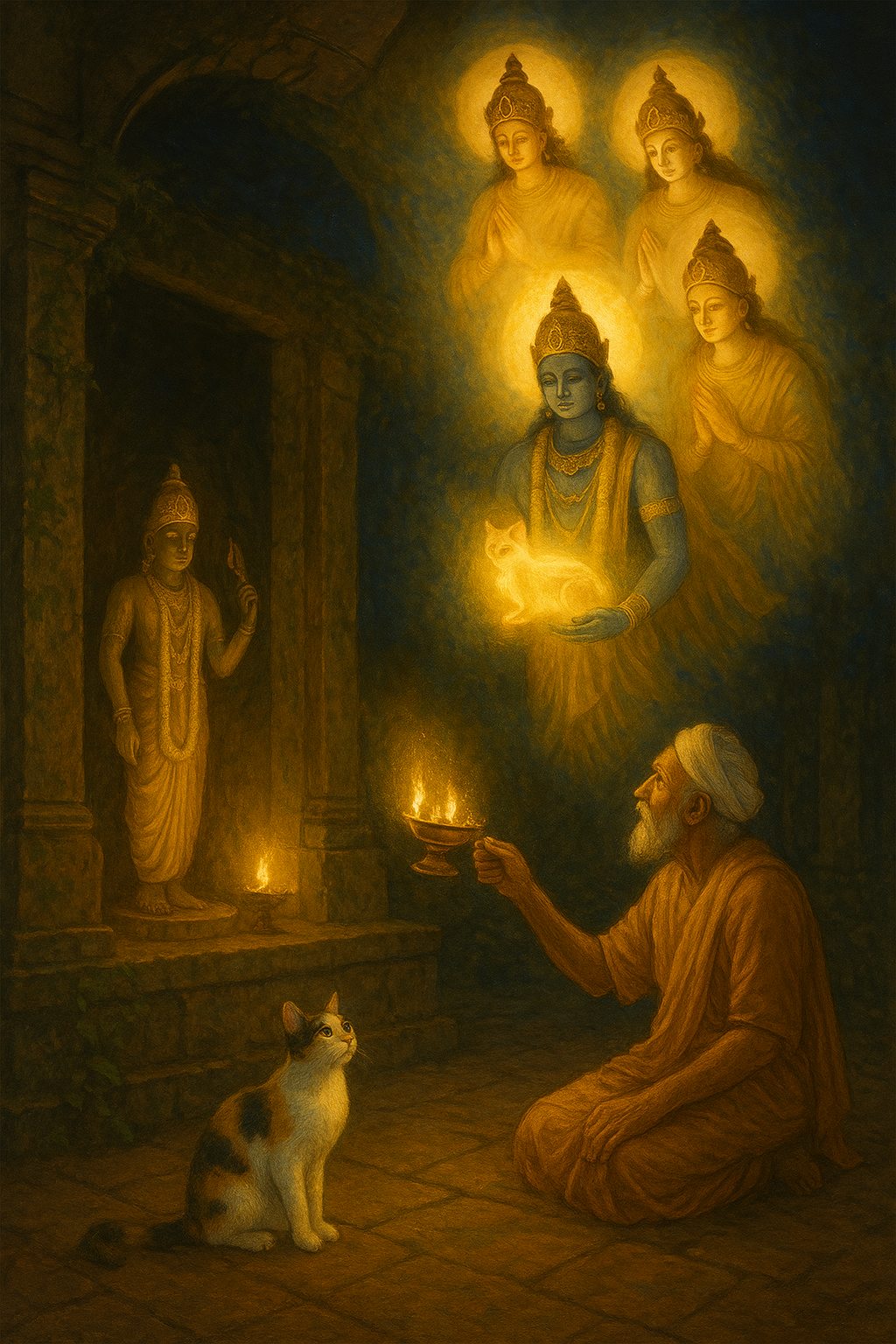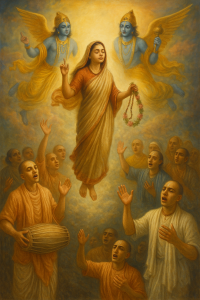Origin: Padma Purāṇa (inspired tale reflecting principles of bhakti and purification through association)
A Humble Temple in a Quiet Village
In a peaceful village adorned with green fields and old banyan trees, stood a humble temple dedicated to Lord Viṣṇu. Though weathered with time, its sanctity was preserved by daily worship, melodious kīrtanas, and the pure hearts of the villagers. Oil lamps flickered gently inside the moss-covered shrine, illuminating the beautiful form of the Lord.
An elderly pujārī, known for his loving devotion, served the temple day and night. He would rise before dawn, gather flowers, cook for the Lord, offer tulasī leaves, and chant mantras with unwavering dedication. His life revolved around this sacred service.
A Stray Visitor Arrives
One day, a stray cat began to loiter around the temple courtyard. Hungry and thin, it meowed hesitantly near the temple steps. The pujārī, moved by compassion, placed a few morsels of prasāda before it. The cat, though cautious at first, slowly accepted the offering.
Day by day, the cat returned—no longer just for food, but for something more. It found shelter near the temple wall, resting in peace as the pujārī performed the daily pūjā. It began to sit near the altar, eyes fixed on the lamp, ears open to the sound of mantras, tail wrapped calmly around its paws.
A Silent Observer of Bhakti
The cat no longer chased birds or roamed the alleys. It stayed near the deity, basking in the fragrance of incense and the sound of sacred chants. Though it uttered no prayers and performed no rituals, its soul, by constant proximity to the Lord and His worship, was quietly transformed.
At first, the villagers found it strange. “A cat attending ārati?” they asked. But the pujārī only smiled and said,
“This creature is more fortunate than many. It hears the holy names daily and receives the dust of the temple. Its life is becoming sanctified.”
The Cat’s Final Blessing
Years passed. One evening, as the temple bells rang and the ārati reached its crescendo, the cat lay peacefully in the corner of the altar room. As the pujārī waved the lamp before the deity, the cat, in utter stillness and calm, breathed its last.
What followed stunned all present.
A divine light descended. From the skies came the Viṣṇudūtas, shining with golden effulgence. Their forms were resplendent, their voices deep and filled with compassion.
They proclaimed:
“This soul, though born in the body of a cat, lived in constant association with the Lord. It saw His form, heard His names, honored His remnants. Its heart, though animalistic, became pure by this contact. It is now liberated.”
Before the astonished eyes of the villagers, the soul of the cat arose—radiant and divine—and ascended with the Viṣṇudūtas to Vaikuṇṭha, the Lord’s eternal abode.
Lessons from the Cat’s Story
- Proximity to the Lord purifies. Even without conscious devotion, association with the deity, the holy name, and prasāda sanctifies the soul.
- The Lord is merciful beyond logic. Whether one comes out of hunger or habit, if one stays near the Lord, the transformation begins.
- Bhakti touches all beings. A creature of instinct can become a liberated soul simply by residing where bhakti flows.
- Scriptural truth confirms this:
“bhakti-pūtaḥ pāda-rajaḥ” – Even the dust of the feet of a devotee purifies one who comes in contact with it.
(Padma Purāṇa)



